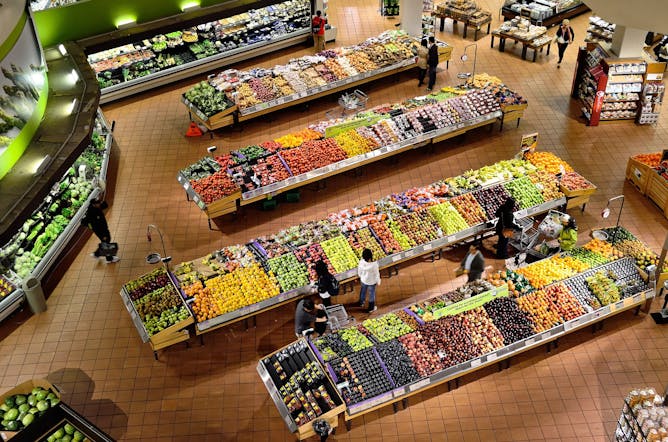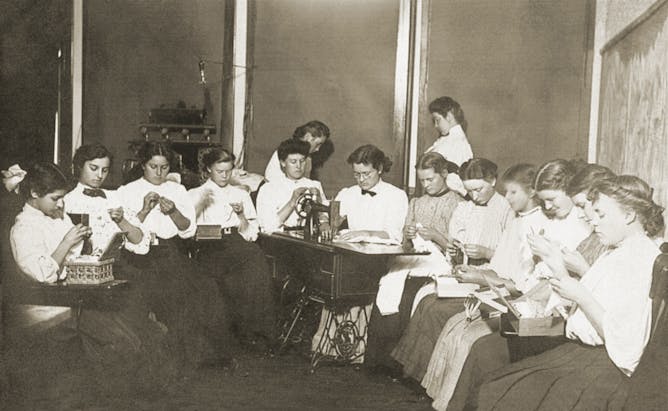|
You may have already noticed food prices climbing. A pint of berries that used to be $3.99 is suddenly $5.99. A pound of butter that was once routinely on sale for under five dollars is now closer to seven. What’s going on?
Global food prices are rising, and after decades of North Americans becoming accustomed to affordable food relative to other costs of living, we’re justifiably startled — and concerned for what it might mean for efforts to eradicate hunger for those among us who are most in need.
Today in The Conversation Canada, Evan Fraser of the University of Guelph and Lenore Newman of the University of The Fraser Valley delve into the North American history of food inflation, and explain that soaring food prices can be avoided via technological innovations and sound public policy.
They write: “We must capitalize on the technology that can help us change the way we produce food. And we can never forget the importance of public policy to ensure there’s a fair price put on things such as biodiversity, climate change, human labour and animal welfare.”
Also today:
Regards,
|

Food prices are poised to become higher post-pandemic. But using technology smartly and humanely can put the brakes to food price inflation.
(Pixabay)
Evan Fraser, University of Guelph; Lenore Newman, University of The Fraser Valley
How to keep food prices down? Use technology to change the way we produce food and public policy to ensure there's a fair price put on things like climate change, human labour and animal welfare.
|

Private messaging apps allow information to spread in an unchecked manner.
(Shutterstock)
Sam Andrey, Ryerson University; Alex Rand, Ryerson University
Canadians are increasingly turning to private messaging apps where COVID-19 misinformation and conspiracy theories spread in an unregulated manner.
|

An archival photo of women sitting in a circle doing embroidery.
(Shutterstock)
Jennifer Brady, Mount Saint Vincent University; Lindsey MacCallum, Mount Saint Vincent University
Calls to reinstate home economics as a solution to modern woes reduce the field to a set of practical skills, undermining its breadth and complexity.
|

Researchers have defined successful transition as the capacity to navigate change.
(Shutterstock)
Gerald Tembrevilla, McMaster University; Andre Phillion, McMaster University; Melec Zeadin, McMaster University
The pandemic has made universities rethink the importance of helping students build social and mentoring connections to support student engagement and academic success.
|

A new understanding of the importance of Grade 1 is beginning to change writing education.
(Shutterstock)
Perry Douglas Klein, Western University
A new understanding of the importance of Grade 1 is beginning to change writing education. If your child is missing important basic skills, talk with your child's teacher to create a plan.
|

Geishas photographiées par des touristes à Kyoto (Japon).
(The Asahi Shimbun/Getty)
Marco Romagnoli, Université Laval
À l’aube d’une prochaine saison touristique, continuerons-nous à voyager comme avant la pandémie ? En étant tous des touristes lorsqu’on voyage, personne n’est exemptée de cette réflexion.
|
Education
|
-
Lynn Bosetti, University of British Columbia; Troy Heffernan, La Trobe University
These are challenging times for university leaders, and new research shows 'smart bullies' are making life even more difficult.
|
|
Arts
|
-
Emlyn Dodd, Macquarie University
New technology mapped the buried ancient Roman site of Falerii Novi. Now archaeologists have started targeted excavation and soil testing to reveal details of life from more than 2,000 years ago.
|
|
Environment + Energy
|
-
Laura Thomas-Walters, University of Stirling; Diogo Veríssimo, University of Oxford
Blackfish struck an emotional chord over the plight of a traumatized performing whale, prompting real change.
|
|